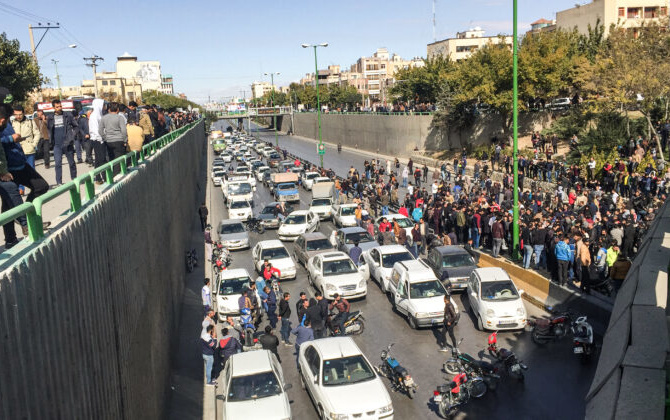Iranian protesters block a road during a demonstration against an increase in gasoline prices, Isfahan, November 16, 2019 (AFP)
Shifting its stance on last month’s mass protests over rising petrol prices, Iran’s regime puts out a message of leniency for some demonstrators, even as others are detained and reportedly under pressure for “confessions”.
Both the Supreme Leader and President Hassan Rouhani issued statements on Wednesday, with Ayatollah Khamenei saying that “Islamic compassion” should be shown.
Khamenei was following up a report by the Supreme National Security Council which recommended compensation for those who were killed, injured, or sustained damage during the protests.
The demonstrations began on November 15 after the heads of the three Government branches — Rouhani, Parliament Speaker Ali Larijani, and judiciary head Ebrahim Raisi — announced a rise of 50% to 200% in the cost of petrol.
The regime has not issued an official death toll, apart from featuring funerals of a Revolutionary Guards soldier and a bystander who were supposedly slain by demonstrators.
Drawing from witnesses, relatives of the dead, and video, Amnesty International says at least 208 protesters, including at least 13 juveniles, were killed as the rallies were suppressed by November 18. The organization warns the actual toll may be far higher — the regime’s cutoff of 95% of the Internet during the protests limited news.
The SNSC’s report suggested that anyone killed who was not a protester should be designated as a “martyr”. Families should be paid “blood money”.
As for slain demonstrators, the report proposed investigations into the background of their families to separate the “respectable” from those “involved in criminal acts”. Families of the former group would be given condolences. and the families of those victims who were not involved in criminal activities be condoled.
The Supreme Leader said, “[The suggestions] should be carried out immediately, and the suspicious people in each group must be treated in a way that is closer to Islamic mercy.”
More than 7,000 people have been arrested, with Iranian authorities saying hundreds of banks — targeted amid anger over corruption — and Government buildings were burnt.
Rouhani: “Some Are Innocent”
Earlier on Wednesday, Rouhani told an insurance conference in Tehran:
Of all those arrested, some are innocent and should be released….
For example, if someone committed an offense torching a tire, this is not a crime to me although he did not do a right thing. But we should not detain them. A youth has…shouted a slogan. We should not be strict.
He continued, “Those who committed misdemeanors should be treated with Islamic clemency.”
But Rouhani left open the space to continue arrests and detention of other protesters, saying that anyone who “carried weapons or committed crimes and those who came to the scene in an organized manner” should be dealt with, according to the law.
Since the start of the protests, the Supreme Leader, Rouhani, and high-level officials have accused demonstrators of being instigated by the US, Israel, and Saudi Arabia; by relatives of the late Shah; and by the “terrorist” Mojahedin-e Khalq organization.
Activists say this line is being used in interrogation of detainees, with the Revolutionary Guards and intelligence agencies seeking “confessions”.
Arrests have continued since the suppression of the protests. Last weekend, at least 50 Tehran University students were reportedly seized in raids of their homes.
Judiciary spokesman Gholam-Hossein Esmaili said Tuesday that detainees found to have been among “saboteurs” face imminent prosecution.
Khamenei and Rouhani appeared to be calibrating the regime’s position amid criticism by some MPs. Reformist MP Mahmoud Sadeqi had challenged the latest arrest, including of the students, while fellow reformist Parvaneh Salahshouri called on Monday for a “truth-finding committee” to investigate the killing of demonstrators, including including 14-year-old Nikta Esfandani.


“…Ayatollah Khamenei saying that “Islamic compassion” should be shown.”
Is shooting people in the back and face part of your “islamic compassion”?